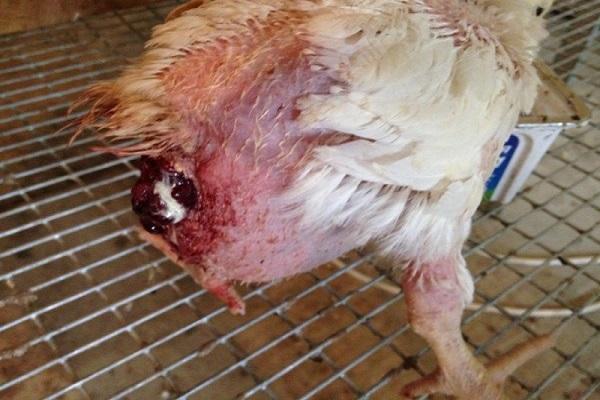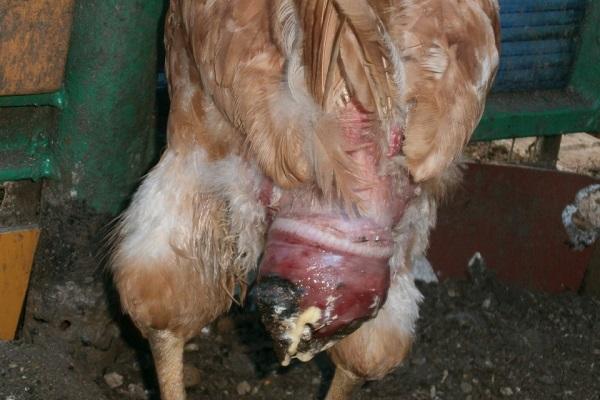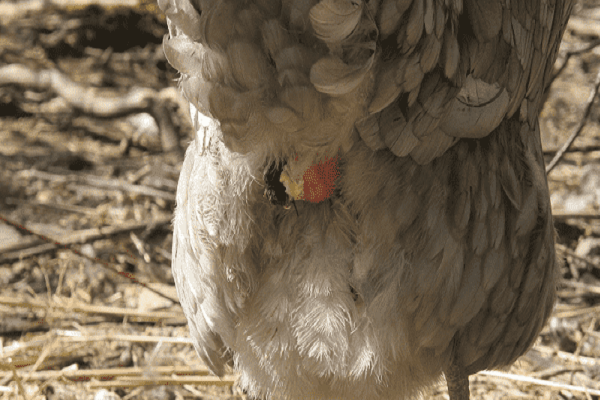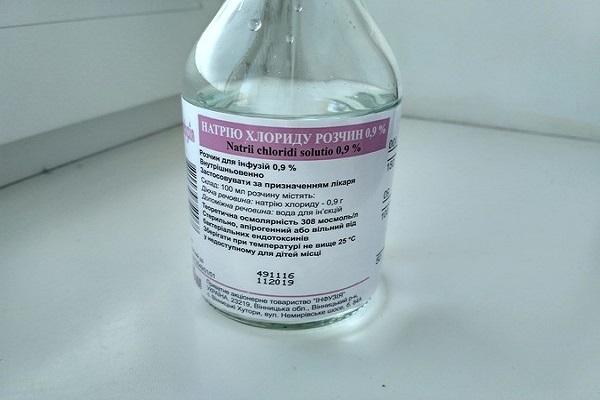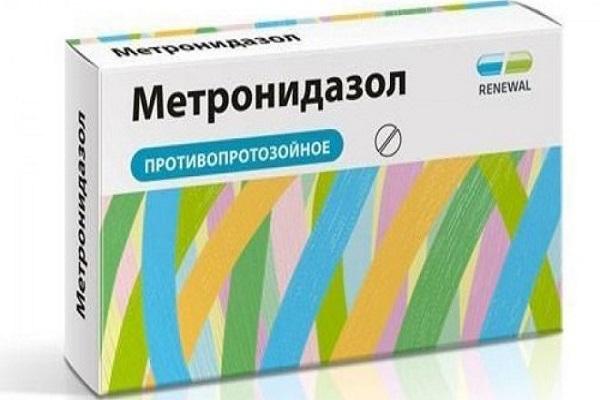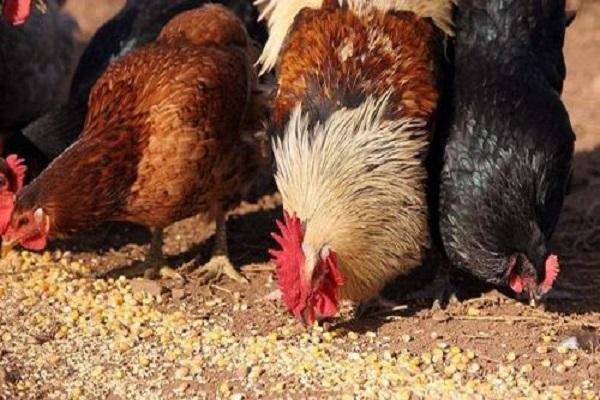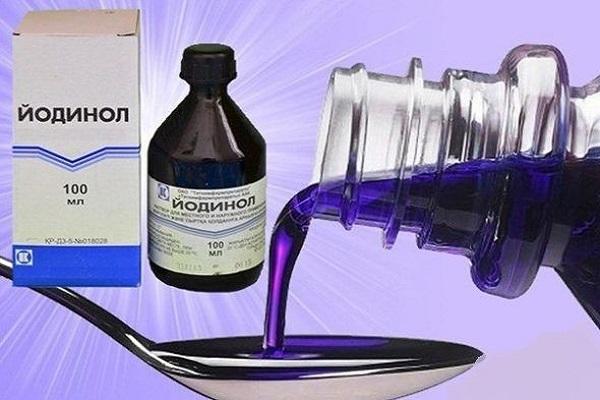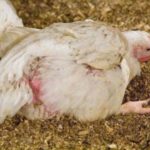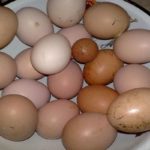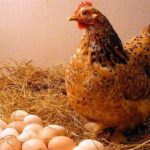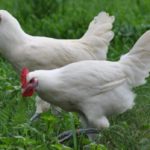One of the most common pathologies of the reproductive system of poultry is prolapse of the oviduct. Laying hens, whose reproductive system bears a heavy load due to intensive egg laying, are especially predisposed to this disease. Lack of treatment will lead to the bird losing its reproductive function and forced culling. To avoid financial losses associated with this, you need to know what to do if a chicken’s oviduct falls out.
Causes of oviduct prolapse in chickens
All non-contagious diseases of birds are usually caused by two reasons: violation of feeding and maintenance rules.
An unbalanced diet of chickens with a lack of calcium, vitamins E, D and choline in the feed, coupled with crowded conditions in cramped cages - these factors cause a decrease in immunity. The normal microflora of the genital tract dies, and pathogenic microorganisms begin to develop in its place. As a result, inflammation of the oviduct (salpingitis) occurs, leading to its loss.
Salpingitis and prolapse of the oviduct can also develop during the transition of pathogenic microflora to the reproductive system of the bird during infectious diseases. Often, inflammatory processes move from the cloaca to the oviduct.
Excess protein and fat in the poultry diet and too long daylight hours contribute to a faster onset of puberty than nature intended. However, the oviduct is not yet fully developed by the time egg laying begins, and, unable to withstand the load, falls out. This happens especially often if the chicken lays eggs that are too large or have two yolks.
A sedentary lifestyle in cage conditions provokes a decrease in the tone of the walls of the oviduct. The passage of eggs through it becomes difficult, and organ prolapse occurs.
Course and symptoms
A sick chicken will experience a cessation of egg laying and a decrease in appetite. The bird becomes lethargic, inactive, and sits in one place most of the time.
When examining the cloaca, a protrusion of the mucous membrane of the prolapsed oviduct is detected.
The cloaca is swollen and red. When the mucous membrane is injured, bleeding wounds appear on it. With salpingitis, there may be a discharge of mucus and purulent masses with a cheesy consistency.
If treatment is not carried out, over time, pathogenic microorganisms penetrate into the prolapsed organ.A severe form of salpingitis develops, in which the oviduct is completely (up to its blockage) filled with gray-white or yellowish exudate of a dense or curdled consistency. The bird loses its ability to lay eggs and stops eating. Due to severe exhaustion, the sick chicken dies.
Diagnosis of the problem
The diagnosis is made based on the clinical manifestations of the pathological condition. If changes in behavior are detected, sick chickens are examined. As a result, a prolapsed oviduct is identified, protruding from the slightly open cloaca.
To determine the cause of the disease, blood is taken for general and biochemical analysis. Based on its results, the presence of inflammation is determined, as well as the content of vitamins and minerals in the body, the lack of which is one of the causes of prolapse of the oviduct.
To determine the type of microorganisms that caused the inflammation, a smear is taken from the mucous membrane of the oviduct and sent for analysis to the laboratory.
Conducting this study will help you choose the right antibiotic to treat your poultry.
How to help a chicken?
The protruding mucous membrane of the oviduct must first be washed with water or saline solution. And then with an astringent - a 2% solution of tannin, alum or potassium permanganate.
To heal wounds and damage, it is recommended to generously lubricate the damage with sea buckthorn oil.
After this, you can try to straighten the organ:
- Put a glove on your hand, lubricate your fingers, cloaca and the protruding part of the oviduct with Vaseline or antiseptic ointment.
- By pressing on the prolapsed organ with your finger, they carefully push it into the cloaca.
- After reduction, temporary sutures can be placed on the cloaca for 24-48 hours to prevent recurrence of the pathology.
If it is not possible to straighten the oviduct in this way, drug treatment is carried out.
For 7-10 days, wash the fallen part twice a day with a salt solution - 10-20 g per 250 ml of water. This solution can be used for microenemas. To prevent inflammation, birds are given 0.5 tablets of Metronidazole (Trichopol) and 1/6 tablet of Sulfadimezine daily orally.
After the course, the oviduct can take on a normal anatomical position on its own. If this does not happen, you need to set it manually.
After repositioning the organ, the chicken is isolated from other birds to prevent pecking, and is given a course of probiotics and vitamins. If salpingitis develops, antibiotics are used.
Disease prevention
In order to prevent the disease, the poultry diet is normalized, as well as living conditions are improved.
The food must contain the optimal amount of protein and fat. It is necessary to introduce vitamin and mineral complexes and premixes into it. The introduction of feed yeast, grass meal and greens into the diet has a good effect.
When keeping chickens in cages, the birds should not be too crowded. The cages are kept clean and the bedding is changed regularly to prevent the development of pathogenic microorganisms. The lighting in the chicken coop should not be bright, and the duration of daylight hours should be maintained at 12-14 hours.
The pullet must be properly prepared for this process before laying eggs. 20-30 days before the start of oviposition, give them a solution of potassium iodide - 2 mg/bird, or choline chloride - 20 mg/bird. This helps strengthen the immune system and increase the poultry’s resistance to pathogens.
Daylight hours a month before the start of egg laying are reduced to 9 hours.This allows you to slow down the process of puberty and gives the organs of the reproductive system the opportunity to develop normally.
Why is it dangerous?
The mucous membrane of the prolapsed oviduct is easily injured, bacteria enter it, and inflammation occurs. Over time, the prolapsed area dries out, ulcerates, and necrosis develops. Injuries provoke pecking. A severe form of the disease causes depletion of the entire body and leads to the death of the hen.
A sick bird stops laying eggs. In severe cases, even after treatment, it does not always recover completely. Such an individual is subjected to forced culling. All this brings financial losses to the farm.

